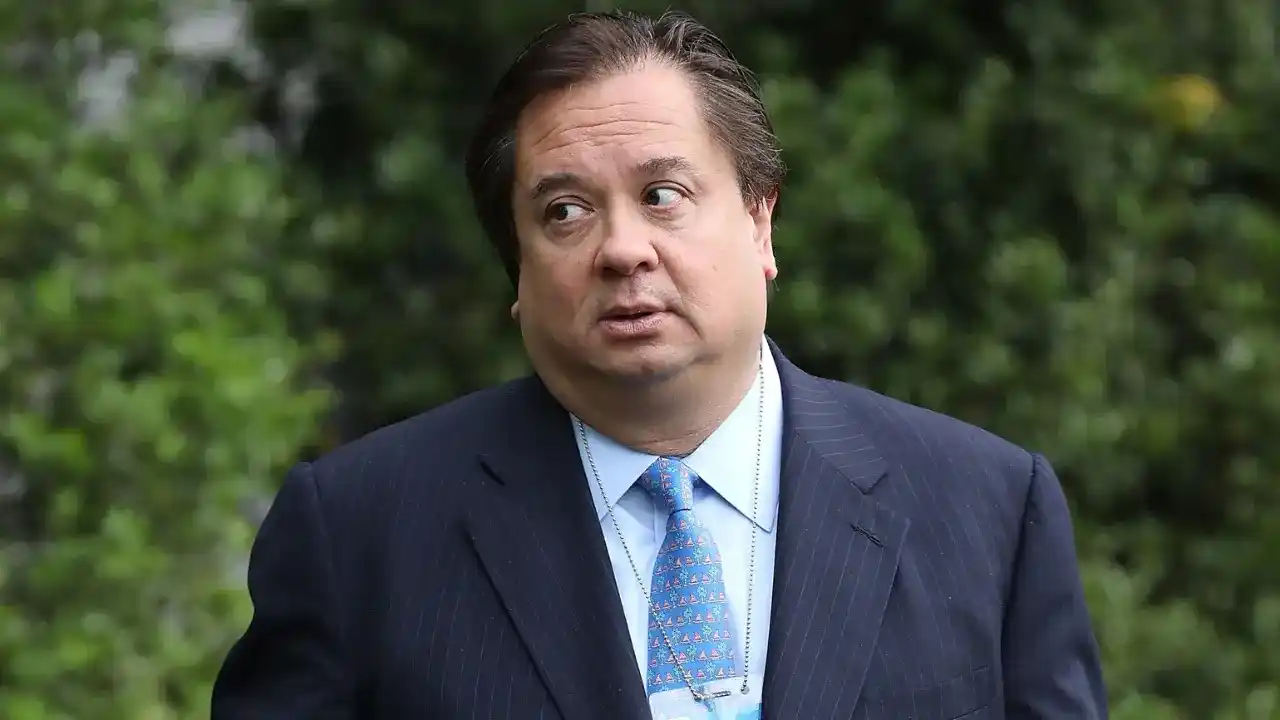George Conway's Inspiring Weight Loss Transformation
Did George Conway lose a significant amount of weight? How did he do it?
George Conway, a prominent conservative lawyer and vocal critic of former President Donald Trump, underwent a major weight loss transformation. He shed around 100 pounds through a combination of diet and exercise.
Conway's weight loss journey serves as an inspiring example of the power of dedication and determination. His story highlights the importance of setting realistic goals, finding an exercise routine that you enjoy, and making healthy eating choices. It's never too late to make a change, and Conway's transformation is a testament to that.
- Will Smith And Diddy Relationship
- Dak Prescott First Wife
- Mike Lindell Net Worth 2024
- Denver Pyle
- Travis Van Winkle
| Name | Date of Birth | Occupation |
|---|---|---|
| George Conway | September 2, 1963 | Lawyer, Author, Political commentator |
| Spouse | Children | Education |
| Kellyanne Conway | 4 | Yale Law School |
Conway adopted a calorie-controlled diet, focusing on lean protein, fruits, and vegetables. He eliminated processed foods, sugary drinks, and excessive amounts of unhealthy fats. By making these changes, he was able to create a calorie deficit, which is essential for weight loss.
Conway made exercise an integral part of his routine. He engaged in regular cardio activities such as running, swimming, and cycling. He also incorporated strength training exercises to build muscle mass, which helps boost metabolism and burn fat. By combining cardio and strength training, Conway maximized his weight loss efforts.
George Conway's Weight Loss Journey
George Conway's remarkable weight loss transformation serves as an inspiration for those seeking to improve their health and well-being. His journey underscores the significance of determination, perseverance, and adopting a holistic approach to weight management.
- Dietary Modifications: Embracing a calorie-controlled diet rich in lean protein, fruits, and vegetables.
- Exercise Regimen: Engaging in regular cardio and strength training exercises to burn calories and build muscle mass.
- Lifestyle Changes: Making sustainable lifestyle changes, such as reducing stress and getting adequate sleep.
- Behavioral Therapy: Seeking professional guidance to address underlying emotional or psychological factors that may contribute to weight gain.
- Support System: Enlisting the support of family, friends, or a support group to provide encouragement and accountability.
- Medical Evaluation: Consulting a healthcare professional to rule out any underlying medical conditions that may impact weight loss.
These key aspects highlight the multifaceted nature of weight loss. By addressing both physical and psychological factors, individuals can increase their chances of achieving lasting success. Conway's journey demonstrates that with dedication and a comprehensive approach, significant weight loss is possible.
Dietary Modifications
Dietary modifications played a pivotal role in George Conway's weight loss journey. By adopting a calorie-controlled diet centered around lean protein, fruits, and vegetables, he created a calorie deficit necessary for weight loss. Lean protein sources, such as chicken, fish, and beans, provided satiety and helped preserve muscle mass during his weight loss efforts. Fruits and vegetables are rich in essential vitamins, minerals, and fiber, which promote overall health and well-being.
Eliminating processed foods, sugary drinks, and excessive amounts of unhealthy fats further contributed to Conway's success. These foods are often high in calories, low in nutritional value, and can contribute to weight gain. By making these dietary changes, Conway was able to reduce his overall calorie intake and improve the quality of his diet.
Conway's dietary modifications serve as a reminder of the importance of nutrition in weight management. By focusing on nutrient-rich, whole foods, individuals can create a sustainable and healthy eating pattern that supports their weight loss goals.
Exercise Regimen
Exercise played a crucial role in George Conway's weight loss journey. By incorporating regular cardio and strength training exercises into his routine, he effectively burned calories and built muscle mass, contributing significantly to his overall weight loss success.
- Cardiovascular Exercise:
Cardio, short for cardiovascular exercise, involves activities that increase heart rate and promote blood flow. Examples include running, swimming, cycling, and dancing. Cardio is essential for burning calories and improving cardiovascular health. In Conway's case, regular cardio sessions helped him create a calorie deficit, a key factor in weight loss.
- Strength Training:
Strength training involves exercises that engage various muscle groups, such as weightlifting, resistance band exercises, and bodyweight exercises. By building muscle mass, strength training helps increase metabolism, which in turn burns more calories. Stronger muscles also improve mobility and overall physical function.
- Consistency and Progression:
Consistency and gradual progression are vital aspects of an effective exercise regimen. Conway made exercise a regular part of his routine, ensuring he engaged in cardio and strength training exercises most days of the week. Over time, he gradually increased the intensity and duration of his workouts, challenging his body and promoting continued progress.
- Enjoyment and Sustainability:
Finding enjoyable forms of exercise is crucial for long-term adherence. Conway chose activities he genuinely enjoyed, making exercise a pleasurable experience rather than a chore. By incorporating variety into his workouts and exploring different exercises, he maintained motivation and sustainability.
Conway's exercise regimen demonstrates the multifaceted benefits of regular physical activity in weight loss. By combining cardio and strength training, he maximized calorie expenditure, built muscle mass, and improved his overall health. His journey highlights the importance of finding an exercise routine that is both effective and enjoyable, setting the stage for long-term success in weight management.
Lifestyle Changes
Sustainable lifestyle changes played a significant role in George Conway's weight loss journey. By incorporating stress reduction techniques and prioritizing adequate sleep, he addressed factors that can often hinder weight loss efforts.
Stress Management: Stress can lead to hormonal imbalances that promote weight gain and make it harder to lose weight. Conway implemented stress-reducing techniques such as meditation, yoga, and spending time in nature. These practices helped him manage stress levels, reducing the negative impact on his weight loss goals.
Adequate Sleep: Getting enough sleep is crucial for weight management. When sleep-deprived, the body produces more of the hormone cortisol, which can increase appetite and cravings. Conway made sure to get 7-9 hours of quality sleep each night, allowing his body to rest and recover, and supporting his weight loss efforts.
Conway's focus on lifestyle changes highlights the importance of addressing both physical and mental well-being in weight loss. By managing stress and prioritizing sleep, he created a conducive environment for successful weight loss and improved his overall health.
Behavioral Therapy
Exploring the connection between behavioral therapy and George Conway's weight loss journey sheds light on the significance of addressing underlying emotional or psychological factors that can impact weight management. Behavioral therapy provides a structured framework for individuals to identify and modify unhealthy behaviors and thought patterns that may contribute to weight gain.
- Cognitive Behavioral Therapy (CBT):
CBT focuses on identifying and challenging negative thoughts and beliefs that can lead to unhealthy eating habits. In the context of weight loss, CBT can help individuals recognize and change distorted thoughts about food, body image, and self-worth that may hinder their progress.
- Dialectical Behavioral Therapy (DBT):
DBT incorporates mindfulness and emotional regulation techniques to help individuals manage stress, improve self-control, and develop healthier coping mechanisms. By learning to regulate emotions and tolerate distress, DBT can empower individuals to overcome emotional eating or other behaviors that may contribute to weight gain.
- Motivational Interviewing:
Motivational interviewing is a counseling approach that helps individuals explore their own motivations for change. In the context of weight loss, motivational interviewing can help individuals identify their personal reasons for wanting to lose weight, address ambivalence, and develop a plan for sustainable change.
- Mindfulness-Based Interventions:
Mindfulness-based interventions, such as mindfulness meditation or yoga, promote present-moment awareness and non-judgmental acceptance. By practicing mindfulness, individuals can become more aware of their thoughts, emotions, and behaviors related to eating, leading to healthier choices and reduced emotional eating.
These facets of behavioral therapy highlight the multifaceted nature of weight loss and the importance of addressing both physical and psychological factors. By understanding and modifying underlying emotional or psychological issues, individuals can create a more supportive environment for successful weight loss and overall well-being.
Support System
A supportive network plays a crucial role in George Conway's weight loss journey. Enlisting the support of family, friends, or a support group provides encouragement, accountability, and a sense of community, which are essential elements for sustained weight loss.
Studies have shown that individuals with strong social support are more likely to achieve and maintain their weight loss goals. Support systems offer emotional encouragement, practical assistance, and a sense of belonging, which can help individuals overcome challenges and stay motivated. Family and friends can provide a listening ear, celebrate successes, and offer support during setbacks.
Support groups, such as Weight Watchers or TOPS (Take Off Pounds Sensibly), provide a structured environment for individuals to share experiences, learn from others, and hold themselves accountable. Group members offer encouragement, share tips and strategies, and provide a sense of camaraderie that can enhance motivation and foster a sense of community.
Conway's own experience reflects the importance of a support system. He credits his wife, Kellyanne Conway, and their children with providing unwavering encouragement and support throughout his weight loss journey. Their positive reinforcement and belief in his ability to succeed played a significant role in his transformation.
Building a strong support system is essential for successful weight loss. By surrounding oneself with supportive individuals or groups, individuals can increase their chances of achieving their weight loss goals and maintaining a healthy lifestyle.
Medical Evaluation
A medical evaluation plays a crucial role in George Conway's weight loss journey and should be considered by anyone embarking on a weight loss program. Consulting a healthcare professional helps rule out underlying medical conditions that may hinder weight loss efforts.
Certain medical conditions, such as hypothyroidism, polycystic ovary syndrome (PCOS), and Cushing's syndrome, can affect metabolism and make it challenging to lose weight. By conducting a thorough medical evaluation, including a physical examination, medical history review, and laboratory tests, healthcare professionals can identify and address any underlying medical issues that may be contributing to weight gain orweight loss.
For instance, if an individual has an underactive thyroid gland (hypothyroidism), their metabolism may be slowed down, leading to weight gain. In such cases, thyroid hormone replacement therapy may be necessary to regulate metabolism and facilitate weight loss.
Consulting a healthcare professional can also help individuals identify any medications they are taking that may cause weight gain as a side effect. By adjusting medications or exploring alternative options, individuals can minimize the impact of medication-related weight gain.
Furthermore, a medical evaluation can uncover any underlying health conditions that may require specific dietary modifications or exercise restrictions. This information is crucial for developing a safe and effective weight loss plan that aligns with an individual's overall health status.
Including a medical evaluation as a component of a weight loss journey is essential for optimizing results and ensuring the long-term health of individuals. By ruling out any underlying medical conditions that may impact weight loss, individuals can increase their chances of achieving and maintaining a healthy weight.
FAQs on George Conway's Weight Loss Journey
This section addresses frequently asked questions surrounding George Conway's weight loss journey, providing concise and informative answers.
Question 1: What was George Conway's primary motivation for embarking on his weight loss journey?
George Conway's primary motivation was to improve his overall health and well-being. He recognized the negative impact excess weight was having on his physical and mental health, and he made a conscious decision to prioritize his health.
Question 2: What were the key components of George Conway's weight loss strategy?
Conway's weight loss strategy involved a multifaceted approach that included dietary modifications, regular exercise, stress management, adequate sleep, and behavioral therapy. He adopted a calorie-controlled diet rich in lean protein, fruits, and vegetables, and engaged in regular cardio and strength training exercises. Additionally, he employed stress-reducing techniques, prioritized sleep, and sought professional guidance to address underlying emotional factors that may have contributed to weight gain.
Question 3: What role did George Conway's support system play in his weight loss journey?
Conway's support system was instrumental in his weight loss success. His wife, Kellyanne Conway, and their children provided unwavering encouragement and support throughout his journey. Additionally, Conway credited his friends and a support group for offering a sense of community, accountability, and motivation.
Question 4: How did George Conway maintain his weight loss after achieving his goals?
Conway has maintained his weight loss by adopting sustainable lifestyle changes. He continues to follow a healthy diet and exercise regularly, ensuring that these practices are integrated into his daily routine. Additionally, he emphasizes the importance of stress management and adequate sleep, recognizing their impact on overall well-being and weight maintenance.
Question 5: What key takeaways can be drawn from George Conway's weight loss journey?
Conway's weight loss journey highlights the importance of a comprehensive approach to weight management. It underscores the significance of addressing both physical and psychological factors, seeking professional guidance when necessary, and building a strong support system. His transformation serves as an inspiration, demonstrating that significant weight loss is possible through dedication, perseverance, and a commitment to overall health.
Conclusion
George Conway's weight loss journey serves as a beacon of inspiration and a testament to the transformative power of dedication and perseverance. His story underscores the multifaceted nature of weight management, emphasizing the importance of addressing both physical and psychological factors.
Conway's journey highlights the crucial role of a comprehensive approach, encompassing dietary modifications, regular exercise, stress management, adequate sleep, and behavioral therapy. It also underscores the significance of building a strong support system, seeking professional guidance when necessary, and making sustainable lifestyle changes for long-term success.
Conway's transformation is a reminder that significant weight loss is possible, regardless of age or starting point. His journey stands as a beacon of hope, inspiring individuals to prioritize their health and well-being, and embark on their own transformative journeys towards a healthier lifestyle.
- Age Of Daniel Radcliffe
- Lalah Hathaway Children
- George St Pierre Wife
- P Diddy And Will Smith Relationship
- Is James May Married

Conway Weight Loss A Transformation Story

Conway Weight Loss. Know About His Diet And Workout Routine.

Conway Weight Loss How Much Weight Did He Lose? Before And